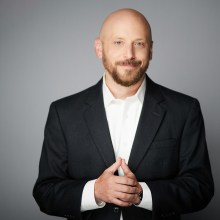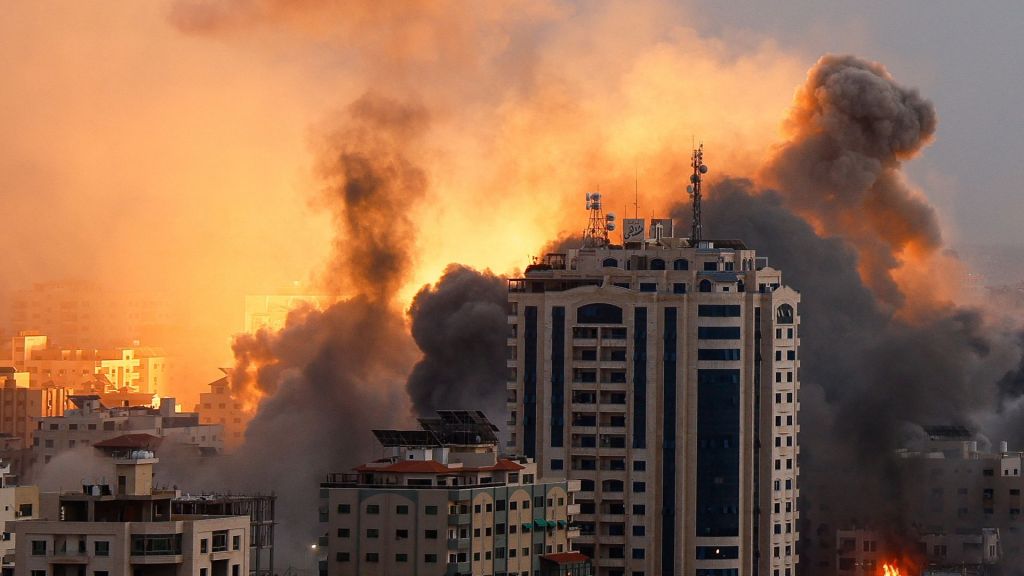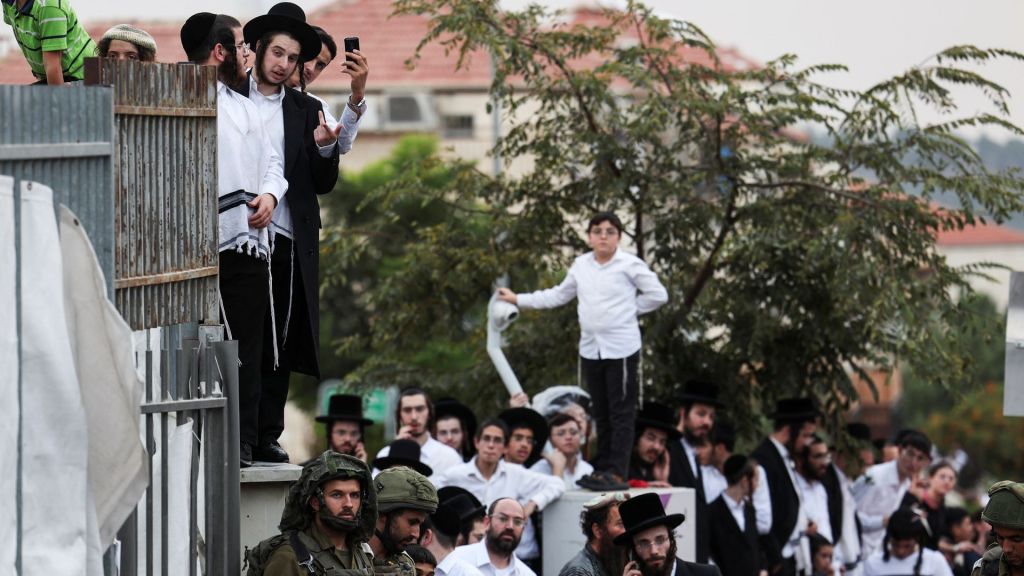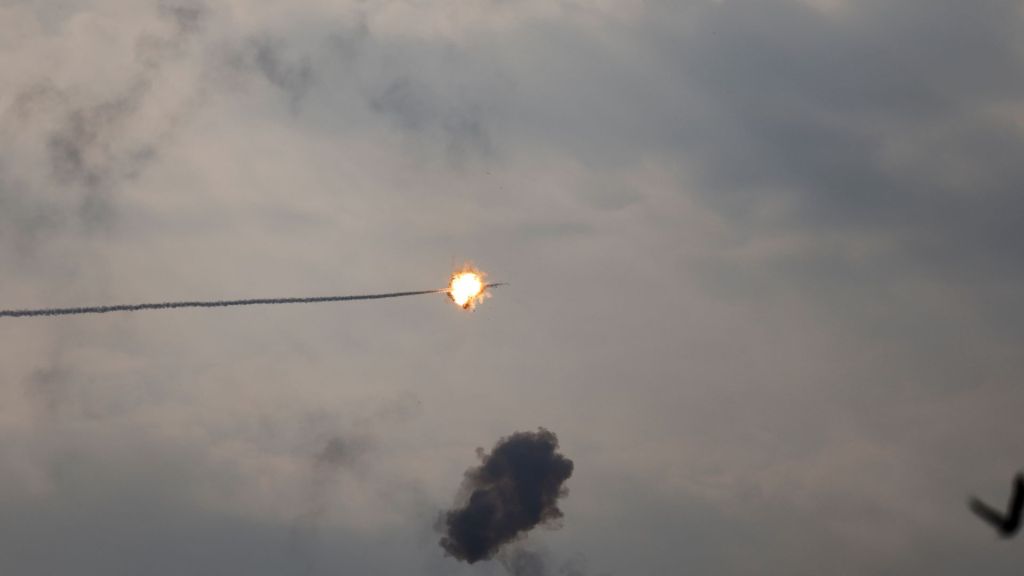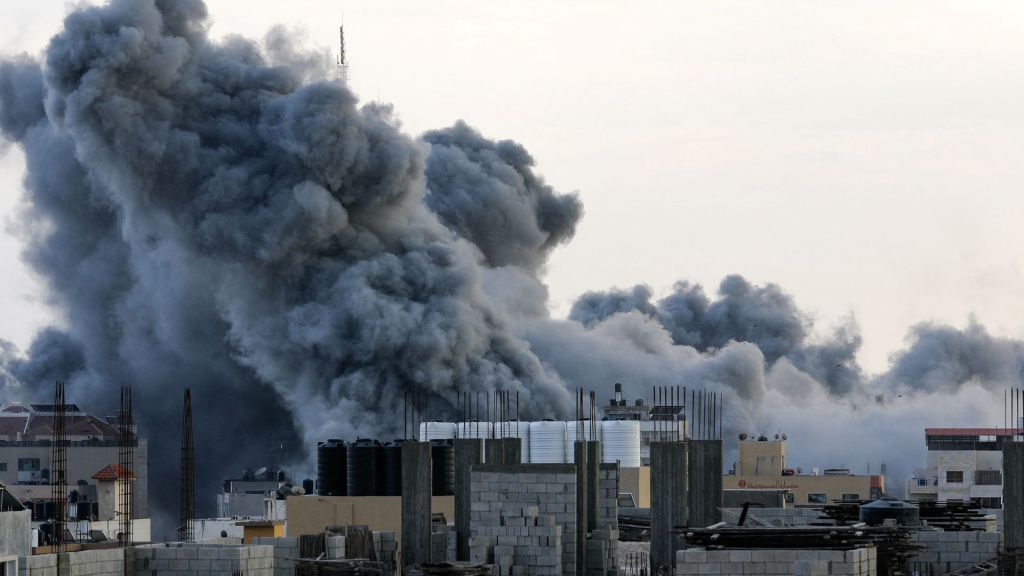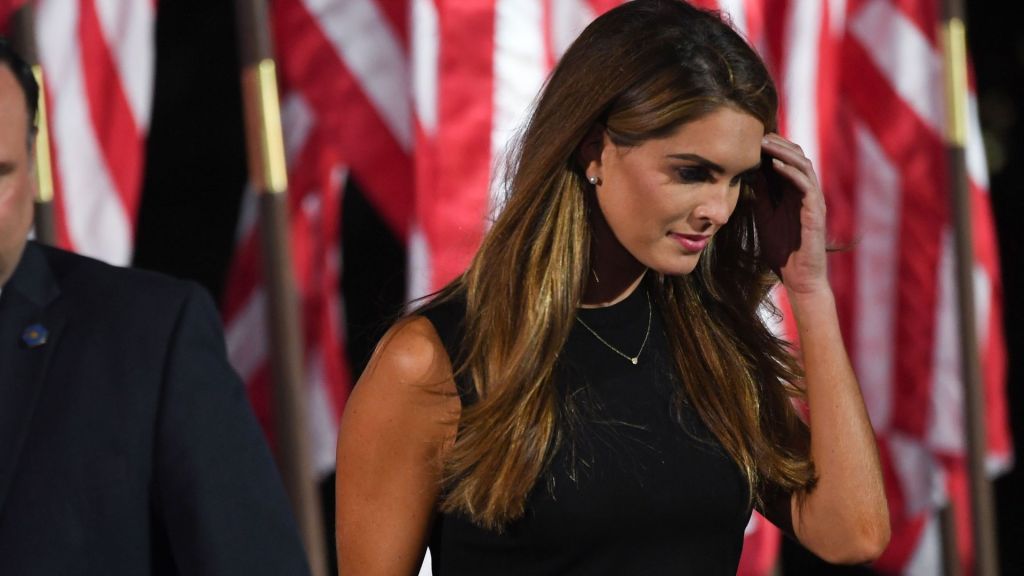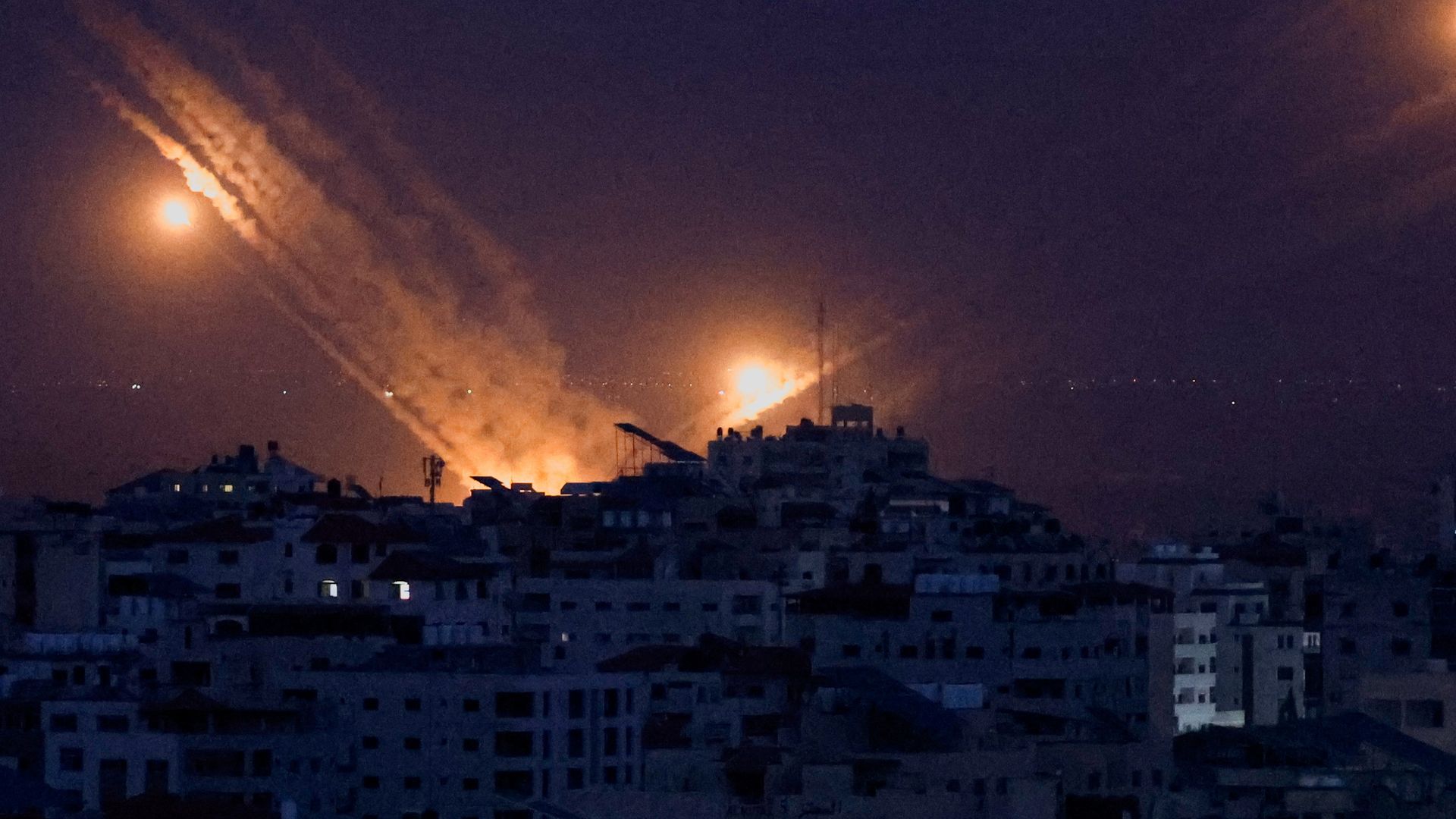
SATURDAY OCTOBER 7TH WAS THE SINGLE DEADLIEST DAY FOR THE JEWISH PEOPLE SINCE WORLD WAR II. MORE THAN 700 PEOPLE IN ISRAEL ARE DEAD–JEWS, ARABS, EUROPEANS, AND AMERICANS.
IN A NATION AS SMALL AS ISRAEL, YOU CAN’T HAVE AN ATTACK LIKE THIS WITHOUT EVERY RESIDENT BEING PERSONALLY IMPACTED IN SOME WAY.
HILLEL FULD IS ONE OF THOSE ISRAELI’S. HE’S A GURU IN THE TECH WORLD AND ONE OF ISRAEL’S MOST ARDENT SUPPORTERS. ONE OF HIS BROTHERS WAS KILLED BY A PALESTINIAN TERRORIST FIVE YEARS AGO. ANOTHER BROTHER IS A MEMBER OF THE KNESSET, ISRAEL’S LEGISLATIVE BODY.
LIKE MOST IN ISRAEL, HILLEL SERVED IN THE MILITARY. HE ALSO HAS FOUR SONS, ONE OF WHOM COULD BE DRAFTED IN THE NEXT FEW MONTHS.
I HAD THE OPPORTUNITY TO SPEAK WITH HILLEL BRIEFLY ON MONDAY, ABOUT 48 HOURS AFTER ATTACKS, TO GAIN HIS INSIGHTS ABOUT WHAT’S UNFOLDING IN ISRAEL.
Robertson
Hillel Fuld. Thank you so much for joining us today. Take me back to Saturday morning, if you would. You know, here in the states you know, we woke up and it was just crazy, but it’s different in Israel. It was Shabbat morning. It’s Sukkot, it’s a holy day. Simchat Torah was starting that evening, it’s a time of joy. People were celebrating, and you woke up to this, this tragedy. Just take me back to that and kind of walk me through it.
Fuld
So let me just correct you first. In Israel, Simchat Torah, is actually combined with Shemini Atzeret, two holidays that are combined in Israel. So, Saturday morning was actually Simchat Torah, and we were dancing with Torah scrolls, which is what Jews do on Simchat Torah. And mid prayers, as we hugged the Torah scrolls, there’s a screech from the women’s section, Azakah! Which means alarm, which means siren. You know, on the way to synagogue five minutes before that with my kids, I had heard, you know, Iron Domes above me, which, sadly to say is not something that’s so uncommon, it by no means there’s a war starting. And so, I didn’t really make much of it. And when they screamed that there’s a siren, that was, that was strange. And we all obviously rushed to the bomb shelter. The problem is that because it was a holiday, there were hundreds of people in synagogue and the bomb shelter was not created for hundreds of people. And so, you know, there was not even close to enough space there. So, the woman went in the men stood by walls and tried to, you know, protect ourselves the best we can. And that was just the beginning. And then, you know, siren after siren after siren after siren. You know, members of communities, sons getting called up one after the other, one after the other. Rabbi’s son gets called up one after the other. And we knew something was very, very serious. The rumors started to circulate, obviously. As far as observant Jews, we don’t, we don’t, we don’t use our phones. So, we were all basing on rumors. And you know, that’s very dangerous. And so, I kind of wanted to believe inside that the rumors could not be true, because how could that–How could that have happened, what people were saying? And for whatever reason, everyone around me was trying to kind of calm me down. I was like, how do I calm down? What happens if these rumors are true? What happens if I come back from Sabbath, I turn on my phone, and there are 75 casualties. For some reason, that number was the craziest number I could imagine. 75 dead, like I….Well, you know. You know what happened. And it’s, it’s been an absolute, you know, zoo since. And I’m, you know, on a personal level and just kind of, you know, made it my role to try to spread as much optimism as I can. And maybe that’s me, you know, using that as a coping mechanism. I don’t know, I’m not a psychologist, but that’s what I’ve been, you know, occupying myself with. But it’s, to say it’s tragic is the understatement of the century. I mean, the deadliest day since the Holocaust, as far as the Jewish nation is concerned. And, you know, people talking about the Yom Kippur War, the deadliest Day in the Yom Kippur war, I think was 310 casualties. Were at 800. So just for perspective, this is this is a historic, historic tragedy.
Robertson
This is not your first, this is not your first experience with terrorism. You have personal, many people in Israel have personal experience with it. But you and your story is somewhat unique. Can you kind of just explain a little bit, your backstory with your brother?
Fuld
Sure. So, we’re from New York originally, been in Israel for 30 years. My older brother…We’re five boys. Ari was one older than me. So, I’m number four. I have a younger brother number five, who’s in the Knesset, in the Parliament. An Ari was one above me, and he was a very outspoken Israel advocate for many years with, you know, millions of people who, you know, read and watched this stuff. And on the eve of Yom Kippur, five years ago, he was shopping for his family, about 20 minutes outside of Jerusalem and a 16-year-old Palestinian kid came and stabbed him in a main artery in his neck. Ari ran after the terrorist, basically with no blood in his veins. Quite supernaturally. And he chased the terrorist and got in a shooting position. Jumped over a wall first and got in a shooting position and shot him. He did not kill him, but he saved a woman who the terrorist was about, I don’t know a few inches from, which was his intended next victim. And then Ari obviously dropped dead. And he got a national hero award from the State of Israel. You know the stories five years later still flow in like, you know, the amount of people that he touched in his life and influence and impacted. He really, one person I would say, really changed, you know, the lives of millions of people. And it’s, on the one hand, obviously, tremendous tragedy on a personal and family level and for the nation of Israel. But I’m not going to lie and say that there is not some serious pride here. You know, my grandmother, rest in peace, was a survivor of Auschwitz. And I always say if I told her one day that your grandson would be a national hero of the State of Israel, your other grandson would be in the Parliament of the State of Israel and your other grandson would be whatever, however you want to describe me. She wouldn’t know what to do with that information. And so, it’s historic times we’re living in. You know, I’ve got to take a wider perspective, despite the personal pain. We’re doing what we can, but we’re dealing with savage, you know, I don’t want to say animals, because it’s highly offensive to animals, but savage beings that have no humanity. Period. And they will stop at nothing. They are driven 100% by killing as many Jews as possible. And I think if I am going to try to maybe squeeze some, you know, lemonade here out of the lemons, I’ll say that at least now the world sees their true face. And I want to believe that, you know, that is something I hope that the world will not forget. You know, in two days or three days or four days when Israel hopefully does what it needs to do in Gaza.
Robertson
Based on what you just said, I think I know what your answer is going to be for this next question, but it kind of leads me into it. There is some debate in Western media about the proper terms to use for Hamas soldiers, are they militants? Are they terrorists? What’s the right term?
Fuld
The answer to that question is: by the very question, we know that the moral compass of Western society has gone out the window a long time ago. The fact that we’re even discussing people that abduct women, children, Holocaust survivors, and we’re even discussing what to call them? Like, what–there’s no discussion. They’re terrorists. Period, full stop, and anybody who has any debate about that needs to seriously check their moral compass.
Robertson
I want to get back to something you said earlier. You said when you were at Synagogue, you’re on your way there and you heard Iron Dome going off. And you know, as sad as it is, that’s part of life in Israel. Hearing the Iron Dome intercepting missiles. It wasn’t necessarily a cause of alarm for you. A lot of observant Jews, you know, they’re not connected to social media during that timeframe. What sort of concerns do you have, as far as like, is the Israeli government’s ability to secure borders and protect its people based on what happened Saturday morning? I mean, there’s people on gliders like, you know, ultralight gliders coming in, fences were blown up. There’s now reports of terror tunnels, and some of the connections ….
Fuld
I’m not equipped to answer that question. If I’m being honest. We don’t know anything yet. You know, I could tell you what kinds of conspiracies, I’d rather not. I just know one thing. What you see is not what you get. This is not what it seems. That I could tell you unequivocally. Because, you know, any soldier that’s ever been on the border with Gaza knows that if a bird flies by they are alerted. There is no way that 400, or however many hundreds of Palestinians on tractors, blowing up the border wall came through without anybody noticing. It’s just not a thing at all whatsoever. 0% chance that happened. So, I don’t know what happened. I know that Hamas pulled one over everyone. For two years, they’ve been planning this. I know that there were the Egyptians tried to warn… again because I don’t know. But what I do know is not…What I do know is that it is not what you think is… what you see is what you get, because there is no way this happened without you know, something more than just Hamas’ sophisticated abilities. Which, you know, they are sophisticated. What they’ve developed in years of us just letting them be, they’ve definitely developed very sophisticated weapons. But that was not enough to pull this off. I don’t know the answer to that question. But we’re going to find out soon.
Robertson
You bet. This morning, the military, I mean, it’s mobilized. Reserves, hundreds of thousands of reserves are being called up. Just from a like a boots on the ground perspective for folks in the West who haven’t seen anything like that, don’t know what that looks like, kind of walk me through that process from a, you know, citizen of Israel.
Fuld
What specifically are you asking about?
Robertson
Well, I mean, are you seeing are you seeing soldiers? Are tanks rolling down the street? Or is your neighbor packing up his bag to go serve? I mean, what, what sort of impacts personally has the mobilization had on your life and on your family’s life?
Fuld
I mean, you know, I live in a town in between Jerusalem and Tel Aviv, there are no tanks on the streets. But, you know, every five minutes I’m hearing about another person that I know that was killed. I just heard about a childhood friend’s son was killed. I just heard about my late brother’s best friend’s son was killed. You know, so if terror, you know didn’t touch most people in the country till now, now everybody knows someone who was killed. You know, I don’t think anybody… You know, someone did ask me ‘are you planning on leaving Israel?’ That thought did not even crossed my mind, and it wouldn’t ever cross my mind. Despite everything that’s going on, I still believe Israel is the safest place for a Jew to be today. I know it’s a funny thing to say. But it’s statistically true. It’s historically true. There’s no debate about it whatsoever. Even with the horrible tragedy that we’re experiencing right now. But, you know, other than that, other than hearing about friends who are losing their relative and loved ones, and obviously you know hearing the booms, hearing the Iron Dome, hearing the bombing of Gaza you know it’s not necessarily deeply impacting my kids. They’re here in my house, thank God. One of my kids was away for the Sabbath, so I had to go pick them up which is a little scary, but um, you know thank God. I mean it hasn’t, I don’t want to jinx anything but, you know we’re here at home safe. You know, when someone knocks on the door, I definitely, you know, check twice before I open it. But other than that, thank God we’re safe.
Robertson
in America obviously there’s you know, the Second Amendment. In Israel, there’s been an increase of purchase certificates for personal, you know, personal weapons at home. Have you felt a need to arm yourself? To protect yourself from, you know, the potential threat of more Palestinians invading?
Fuld
My brothers are all armed. They all officially live over the green line, you know, in the quote unquote settlements. I am not armed. I never owned a gun, and I have no intention of owning a gun. If I’m being totally kind of transparent and honest with you, I don’t like guns. You know, we all fight our battles. My battle, I view, is in front of the keyboard. I was in the Army. I served in the military; I was in artillery. You know, I dealt with, you know, shooting cannons. And, you know, from my perspective, for as long as I live, I never want to smell that gunpowder again. Because it’s, I don’t want to use the word trauma, but it’s not something I want in my life ever again.
Robertson
Israel has mandatory service, you have two sons, correct? I have four sons, four sons. Sorry. As a dad. I mean, what’s going through your mind right now? This war is starting, you have four sons?
Fuld
I mean, listen, at some point. You know, I have to I have to look up to the heavens, right? I have to, I have to tap into my faith. Because if I’m going to, you know, only look at this from a, let’s call it ‘human perspective,’ then I won’t be able to deal with the anxiety, right? My oldest son is 19. He’s in a pre-Military Academy. Now, he’s probably drafting in the next couple of months. To say I’m not terrified. That would be a lie. My second son, you know, is not far off, about a year. My twins are 12. They have some time. But, you know, the thought is, is paralyzing. It’s terrifying, of course.
Robertson
Before Saturday, you know, from an outside observer, there was a lot of divide in Israel about, you know, you said, quote, unquote, settlements earlier. There’s this idea of the two-state solution. And there’s just, I mean, there’s a lot of division within Israel. What to do with the Palestinians? What to do with West Bank, and what to do with Gaza? Like, do we deal with them together or separate? What’s the feeling now? Is there more of a unified feeling now?
Fuld
I think the feeling here is no different than the feeling globally, and that is that the Palestinian cause is rest in peace. Thank God. So, if I’m going to find, you know, a little cup half full of perspective, I don’t think anyone in their right mind– and when I say that I don’t mean “anyone.” There are people, there are still people marching the streets of New York supporting the Palestinian cause…excuse me for saying it this way. But if you’re supporting the cause of people that just abducted old women and children, and I don’t even want to think what they did to them, then you are a terrorist. Full blown. I’m not even ashamed to say that anymore. I would have said it a little more moderately about three weeks ago. And I would have said, ‘you’re supporting terror.’ But now if you’re supporting the Palestinian cause, today, after what you’ve seen, that’s just full-blown terror support. And so, I don’t think anyone in their right mind thinks that Two-State Solution is on the table. I think everyone understands the reality, which is what I’ve been screaming and yelling, and Ari, my older brother, late brother used to say all the time, which is this is not about land. If they wanted land, they would have had land years ago. W gave them Gaza, they had land. This isn’t about land. They say it. It’s about time we listen to them. This is about dead Jews, period. I think the world now understands that. And again, maybe this is me trying to be cup half full, but to me, maybe that’s something positive that came out of out of all of this. Which is the mask that the Palestinian people have worn for so long, has now been removed and the world sees it just as clearly as I see it, as my brother saw it. And I think that that’s extremely important diplomatically and politically.
Robertson
Bibi Netanyahu said, you know, we’re committed to it. There’s support within the US. I mean, Nikki Haley and other presidential candidates have said, you know, ‘finish them.’ President Biden has said, you know, ‘Israel has the right to support itself from terrorists. Full stop.’ Is this unfortunately, the tragedy that needed to happen and you kind of spoke to a little bit of it, the cup half full? Is this the tragedy that needed to happen in order for Israel to kind of take the gloves off, go into Gaza and, you know, clean house?
Fuld
I mean, I can answer that from a few different perspectives. As a Jew, I want to believe that we are a nation of mercy and of compassion. And we, you know, we pray in our prayers 100 times a day for peace. Peace is the most fundamental pillar of Judaism. And so, I believe, you know, somewhere deep down, we’ve been naive. We’ve been really naive thinking, maybe they’ll change. Maybe they’ll change. Maybe there’ll be a moderate leader. Maybe there’ll be an uprising. Maybe, maybe they’ll change. And so, you know, the thought of going into Gaza and flattening Gaza, you know, that’s not a Jewish concept. Right? And so, I think we’ve kind of, you know, avoided the topic altogether. And, you know, just the whole disengagement. I mean, I could talk about this for hours. It’s an absolute travesty, and a historic, you know, mistake of unprecedented proportions, as far as I’m concerned.
But unfortunately, this is what needed to happen. And I still don’t know if we’re going to do what needs to be done. I hope to God that we do. I don’t even know what needs to be done, because I’m not a military strategist. And, you know, the one thing that people need to understand is that in every war in history, innocent people are killed. No one would claim that World War Two was unjustified. There were millions of innocent Germans killed. No one’s going to say, ‘Oh, but they were innocent.’ And you know what? It’s sad when innocents are killed. There’s no question. But as you know, there’s that famous video, the silent majority is irrelevant. It doesn’t matter how many of these Palestinians dance in the streets and give out candies, there’s many hundreds of 1000s if not more, it doesn’t matter. Because even if the majority is, you know, even if the majority does want peace, if they’re sitting there letting Hamas, electing Hamas, letting Hamas…then as far as I’m concerned, you know, they’ve gotten their death wish. And unfortunately, they’re going to be innocents who are killed. But that’s, like I said, every war. I hope we do what we need to do. And again, I’m not going to say what we need to do, because I’m not a military strategist. I don’t know. I know what my heart and my emotions, tell me what we need to do. But obviously, that’s not the way to run and conduct a war. So, I hope that, you know, we have the smartest people in this country, and I hope that we make the right decision to do what we need to do. Finally. It’s unfortunate that this had to happen for us to reach that conclusion.
Robertson
What else do we need to know? Hillel, what else? What else is the world? What else does that world not know?
Fuld
I mean? This is the deadliest days since the Holocaust for the Jewish people. We need to understand the proportions here. And you know, if you pray, pray. And if you don’t pray, pray. You know, just say the words. Just say the words. It doesn’t hurt. Just say it. We need it. We need it badly. You know, I’m sitting here talking to you on my phone is exploding from all the infiltrations that have got to Israel from Gaza, from the north from the south. It’s all over the place, and it’s not stopping. So, we need prayers. You know, we do have the strongest, one of the strongest armies in the world. We do know what we need to do, but we still need prayers. So, I guess that’s the last thing I could say is just pray for us because we really do need it.
Robertson
Hillel thanks so much for joining me today. I really appreciate it.
Fuld
Thanks for having me.
